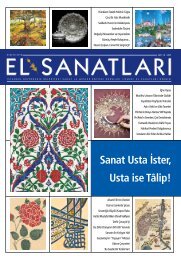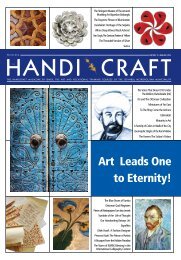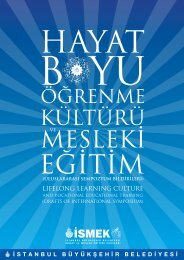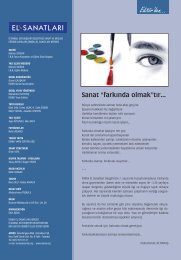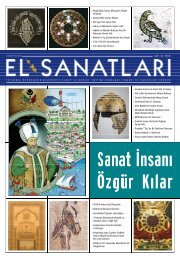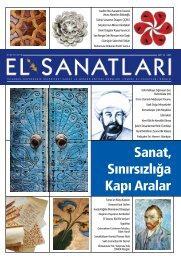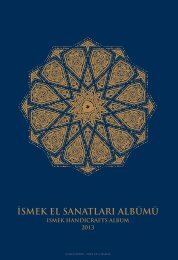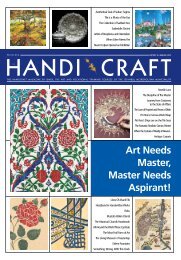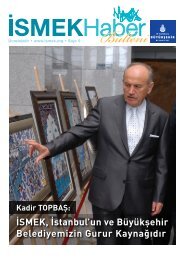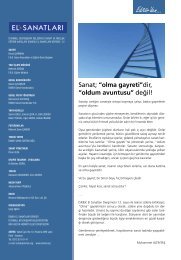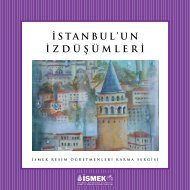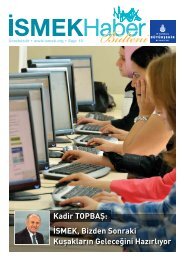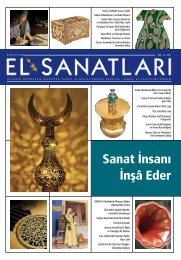Download Link - Ä°SMEK
Download Link - Ä°SMEK
Download Link - Ä°SMEK
You also want an ePaper? Increase the reach of your titles
YUMPU automatically turns print PDFs into web optimized ePapers that Google loves.
After telling about this event, Ökten explains his own<br />
ideas for a reformation: If we wish to understand our<br />
missing civilisation, “we have to read the works by the<br />
supreme personalities of this civilization." he adds:<br />
“today people have to read Yahya Kemal first, in order<br />
to understand what Fuzuli said.”<br />
We Are the Poor Guards of a Big Treasure<br />
There are too thick curtains between big personalities<br />
of our civilization and us. These curtains are so<br />
intense and heavy for us. In his poet "the festival<br />
morning in Suleymaniye", Yahya Kemal says, “The<br />
dusty curtain of time is fading away from the scene”.<br />
Okten thinks that quality factor steps in at this point.<br />
He also adds that the first condition of promoting<br />
quality is qualifying oneself.“For instance, suppose<br />
that an important intellectual figure, love him or<br />
loathe him, has passed through our civilisation. There<br />
is a group peculiar to him. When you read his books,<br />
you will realise that he is a qualified person. Unfortunately,<br />
though, it can not be achieved by reading just<br />
two books, using lots of footnotes and quote too<br />
much like some intellectual figures do today.What<br />
matters is what you yourself say.<br />
Built Your Existence<br />
One of the important roles on the formal breaking<br />
points in societies belongs to the youth. There are a<br />
variety of ways and phases to prepare for this role. According<br />
to Okten, the most important and nesessary<br />
one of these ways is to live the reality while building<br />
one's own existence by retiring to oneself. He first tells<br />
a story that happened many years ago: “In Vienna,<br />
a lady who was studying there came up to me and<br />
said she was bored and that she wanted to come back<br />
to Turkey. She asked for my opinion about it.” Upon<br />
hearing this, Okten suggests an interesting solution to<br />
the young lady. “Stay in Vienna," he says. "Live there<br />
for thirty or fourty years but keep your values. If you<br />
can achieve this, you can become a role model. If you<br />
have no solid or reliable values, it doesn't mean anything<br />
to stay in Vienna.<br />
Ökten soon adds, though, that the aforesaid criteria<br />
and values are not written in books, and he says that<br />
though books can be altered, those criteria are written<br />
in a person's heart, and the heart cannot be altered.<br />
With these words, he emphasizes that the criteria of<br />
each person is peculear to him or her, and his or her<br />
own civilization. As the concluding remarks of the interview,<br />
Okten gives us a formula he has acquired due<br />
to his experiences: “The heart finds the first place for<br />
itself in the adventure of rendering the codes of the<br />
civilization in the perception of civilization and human.<br />
Because in the case of opinion flows, inspiration is received<br />
from hearts, not from books.”<br />
Prof. Dr. Saadettin OKTEN<br />
Sadettin Okten was born in 1942, Soğanağa, Beyazıt. Since he knew to read,<br />
he began his school life from second class at Koca Ragıp Paşa, in 1949. At<br />
the same time, he followed the talks of his father Mahmud Celaleddin Okten<br />
who was the legendary literature teacher of the high school of Kabataş,<br />
Daruşşafaka and Vefa and the founder of the religious vocational schools.<br />
Okten began to Vefa High School in 1953. He graduated from faculty of<br />
construction at ITU and began his academic life at faculty of architecture in<br />
ITU at the same year. Between the years 1971 and 1973 he has been in<br />
USA as a doctorate student then he received the title of doctor in<br />
1977. He studied in Belgium in 1979 and 1980 and he received<br />
the title of associate professor in 1982. Okten came<br />
to MGSU faculty of architecture in 1985 and he became<br />
the professor in 1989. Then he retired in<br />
2004 voluntarily. He is praiseworthy with<br />
his knowledge about “civilization of<br />
Islam”, “western civilization”,<br />
and “city”. Prof. Dr. Sadettin<br />
Okten continue his<br />
studies recently.



